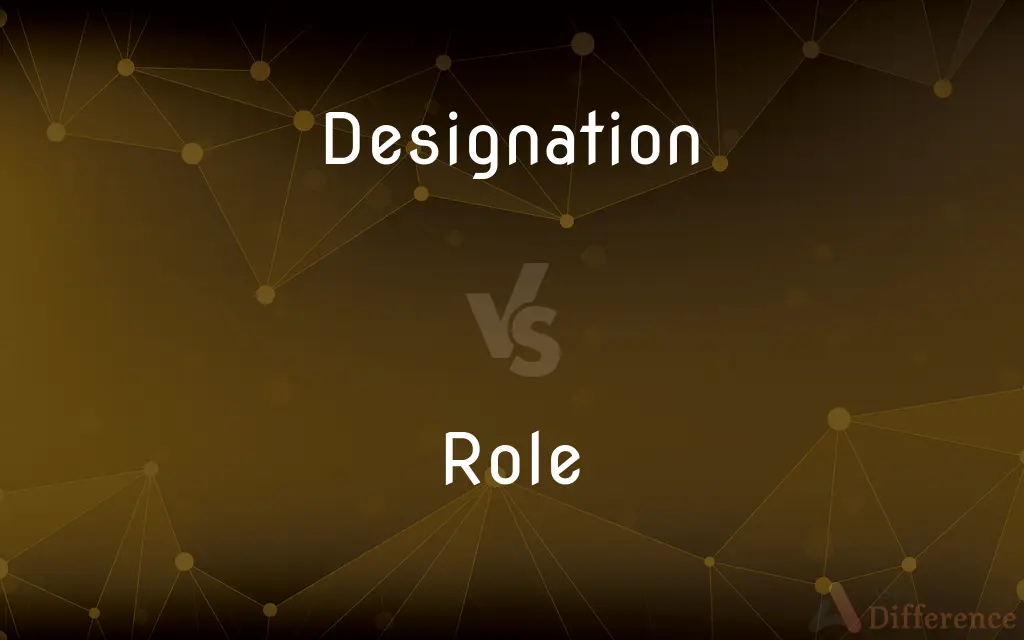Designation vs. Role — What's the Difference?
By Tayyaba Rehman & Fiza Rafique — Updated on March 12, 2024
Designation refers to the official title or position held by someone, indicating status or function, whereas role denotes the expected behavior and duties associated with a position or status.

Difference Between Designation and Role
Table of Contents
ADVERTISEMENT
Key Differences
Designation is a formal label or title given to an individual within an organization to signify their official position or status. It often reflects hierarchy, specialized function, or authority, such as "Manager" or "Vice President." Whereas, role encompasses the set of responsibilities, behaviors, and duties expected from a person occupying a certain position or status. It describes how someone is supposed to act in their capacity within an organization or society.
While a designation is often assigned through formal processes and is recognized officially within the organizational structure, roles can be more fluid, sometimes evolving based on the needs of the organization, group dynamics, or societal expectations. For instance, someone with the designation of "Project Manager" may take on roles that go beyond managing projects, including mentoring team members. On the other hand, a role does not necessarily require a specific designation to be effective or recognized. For example, a team member without a formal leadership title may naturally assume the role of a leader within a group, guiding decision-making processes and supporting colleagues without having a managerial designation.
Designations are typically specific to the context of an organization or a formal group and are essential for clarity in communication, hierarchy, and understanding organizational structure. In contrast, roles can be more broadly defined and exist across various contexts, including social, familial, and informal groups, highlighting how individuals contribute to the overall dynamics and functions of these entities.
While designations can often be tied to specific skill sets, qualifications, or professional achievements, roles are more about the actions and behaviors expected of someone in their capacity within a group or society. This distinction underscores the difference between what someone is called and what they are expected to do.
Comparison Chart
Definition
Official title or position within an organization
Expected behavior and duties of a person in a position or status
ADVERTISEMENT
Context
Formal, organizational
Broad, including social, organizational, familial
Assignment
Through formal processes, based on hierarchy or specialization
Can be assumed naturally based on group dynamics or societal expectations
Focus
On the title or position held
On the duties and behaviors expected
Flexibility
Generally fixed within the organizational structure
More fluid, can evolve based on needs and interactions
Compare with Definitions
Designation
An official classification or naming within a structure.
Each employee's designation is listed next to their name on the organizational chart.
Role
A part played by an individual within a certain context.
His role in the project involved coordinating the marketing team.
Designation
A term used to describe one's professional position.
His designation in the company has changed three times in the last five years.
Role
The contribution of an individual to a group or team effort.
Each member's role is crucial for the team's success.
Designation
A label signifying authority or function in an organization.
The designation 'Senior Analyst' comes with specific responsibilities.
Role
The expected set of behaviors and duties for a position.
In her role as mentor. she provides guidance to newer employees.
Designation
A formal title given to an employee within a company.
Her designation as Chief Financial Officer was announced last Monday.
Role
The function or part an individual plays in a particular situation.
She took on the role of mediator during the negotiations.
Designation
The act of assigning a specific title to a role or position.
The designation of team leaders will be done by the end of the week.
Role
A set of expectations associated with a status or job.
The teacher's role extends beyond just delivering lectures.
Designation
The action of choosing someone to hold an office or post
A leader's designation of his own successor
Role
A role (also rôle or social role) is a set of connected behaviors, rights, obligations, beliefs, and norms as conceptualized by people in a social situation. It is an expected or free or continuously changing behavior and may have a given individual social status or social position.
Designation
The act of designating; a marking or pointing out.
Role
Also rôle A character or part played by a performer.
Designation
Nomination or appointment.
Role
The characteristic and expected social behavior of an individual.
Designation
A distinguishing name or title.
Role
A function or position.
Designation
An act or instance of designating; a pointing out or showing; indication.
Role
(Linguistics) The function of a word or construction, as in a sentence.
Designation
Selection and appointment for a purpose or office; allotment; direction.
His designation as chief justice was controversial.
Role
A character or part played by a performer or actor.
My neighbor was the lead role in last year's village play.
Her dream was to get a role in a Hollywood movie, no matter how small.
Designation
That which designates; a distinguishing mark or name; distinctive title; appellation.
Role
The expected behaviour of an individual in a society.
The role of women has changed significantly in the last century.
Designation
Signification, meaning, for example of a word or phrase.
Role
The function or position of something.
Local volunteers played an important role in cleaning the beach after the oil spill.
What role does the wax in your earhole fulfill?
Designation
The act of designating; a pointing out or showing; indication.
Role
Designation that denotes an associated set of responsibilities, knowledge, skills, and attitudes
The project manager role is responsible for ensuring that everyone on the team knows and executes his or her assigned tasks.
Designation
Selection and appointment for a purpose; allotment; direction.
Role
(grammar) The function of a word in a phrase.
Designation
That which designates; a distinguishing mark or name; distinctive title; appellation.
The usual designation of the days of the week.
Role
(object-oriented) In the Raku programming language, a code element akin to an interface, used for composition of classes without adding to their inheritance chain.
Designation
Use or application; import; intention; signification, as of a word or phrase.
Finite and infinite seem . . . to be attributed primarily, in their first designation, only to those things which have parts.
Role
A part, or character, performed by an actor in a drama; hence, a part of function taken or assumed by any one; as, he has now taken the rôle of philanthropist.
Designation
Identifying word or words by which someone or something is called and classified or distinguished from others
Role
The actions and activities assigned to or required or expected of a person or group;
The function of a teacher
The government must do its part
Play its role
Designation
The act of putting a person into a non-elective position;
The appointment had to be approved by the whole committee
Role
An actor's portrayal of someone in a play;
She played the part of Desdemona
Designation
The act of designating or identifying something
Role
What something is used for;
The function of an auger is to bore holes
Ballet is beautiful but what use is it?
Role
Normal or customary activity of a person in a particular social setting;
What is your role on the team?
Common Curiosities
What does a role entail?
A role entails the responsibilities, behaviors, and duties expected from an individual in a certain position or status.
How is a designation determined?
Designations are determined through formal organizational processes, often based on hierarchy, specialization, and professional qualifications.
Can someone have multiple roles with a single designation?
Yes, an individual can assume multiple roles within the scope of a single designation, depending on the needs and dynamics of the organization.
Is it possible to have a role without a designation?
Yes, individuals can assume roles informally based on societal, familial, or group expectations without having a formal designation.
What is a designation?
A designation is an official title or label given to someone in an organization, indicating their position or status.
How does one acquire a new designation?
Acquiring a new designation usually involves professional growth, promotion, or change in responsibilities within an organization.
Is designation more important than role?
Importance varies by context; designation reflects official status within an organization, while role focuses on the expected contributions and behaviors.
Can roles change without changing designation?
Yes, roles can evolve and change based on group dynamics, societal expectations, or organizational needs without a change in designation.
Why are designations important?
Designations are important for clarity in communication, understanding organizational hierarchy, and recognizing authority or specialization.
How do societal roles differ from organizational roles?
Societal roles are based on cultural, familial, or community expectations, while organizational roles are specific to the functions within an organization.
What happens if someone fails to perform their role effectively?
Failing to perform a role effectively can lead to consequences within an organization or group, including reassignment, training, or in severe cases, dismissal.
Can one's role in society have a designation?
Societal roles generally do not have formal designations but are recognized through societal norms and expectations.
Can a designation affect one's role?
Yes, a designation can affect one's role by defining the scope of responsibilities and authority within an organization.
Are roles the same across different organizations?
While some roles may have similar core responsibilities, the specific duties and expectations can vary significantly across different organizations.
How are roles and designations communicated within an organization?
Roles and designations are usually communicated through organizational charts, job descriptions, and formal announcements or recognition.
Share Your Discovery

Previous Comparison
Flavour vs. Spice
Next Comparison
Wool vs. LeatherAuthor Spotlight
Written by
Tayyaba RehmanTayyaba Rehman is a distinguished writer, currently serving as a primary contributor to askdifference.com. As a researcher in semantics and etymology, Tayyaba's passion for the complexity of languages and their distinctions has found a perfect home on the platform. Tayyaba delves into the intricacies of language, distinguishing between commonly confused words and phrases, thereby providing clarity for readers worldwide.
Co-written by
Fiza RafiqueFiza Rafique is a skilled content writer at AskDifference.com, where she meticulously refines and enhances written pieces. Drawing from her vast editorial expertise, Fiza ensures clarity, accuracy, and precision in every article. Passionate about language, she continually seeks to elevate the quality of content for readers worldwide.















































